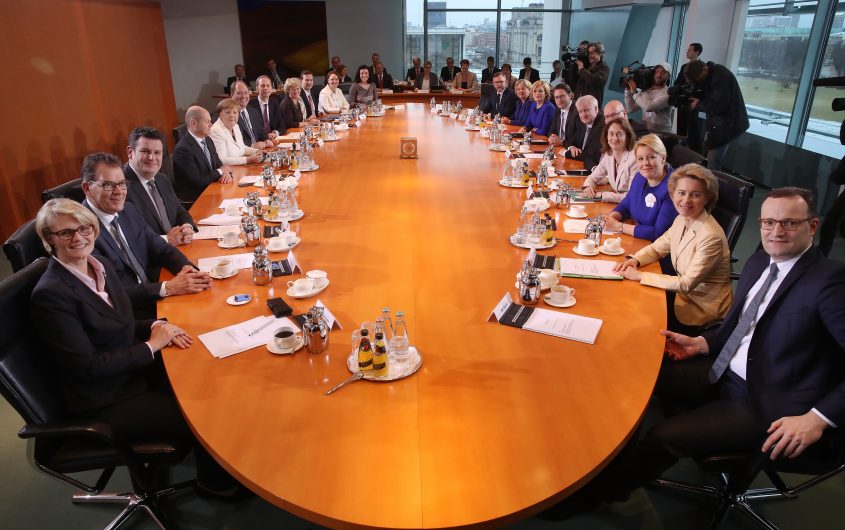
Sean Gallup/Getty Images
Merkel 4.0: Bridge to a New Generation of Leaders

Stephen F. Szabo
Senior Fellow
Dr. Stephen F. Szabo is a Senior Fellow at AICGS, where he focuses on German foreign and security policies and the new German role in Europe and beyond. Until 2017, he was the Executive Director of the Transatlantic Academy, a Washington, DC, based forum for research and dialogue between scholars, policy experts, and authors from both sides of the Atlantic. Prior to joining the German Marshall Fund in 2007, Dr. Szabo was Interim Dean and Associate Dean for Academic Affairs and taught European Studies at The Paul H. Nitze School of Advanced International Studies, Johns Hopkins University. He served as Professor of National Security Affairs at the National War College, National Defense University (1982-1990). He received his PhD in Political Science from Georgetown University and has been a fellow with the Alexander von Humboldt Stiftung, the Woodrow Wilson International Center for Scholars, and the American Academy in Berlin, as well as serving as Research Director at AICGS. In addition to SAIS, he has taught at the Hertie School of Governance, Georgetown University, George Washington University, and the University of Virginia. He has published widely on European and German politics and foreign policies, including. The Successor Generation: International Perspectives of Postwar Europeans, The Diplomacy of German Unification, Parting Ways: The Crisis in the German-American Relationship, and Germany, Russia and the Rise of Geo-Economics.
Angela Merkel was sworn in as Chancellor of Germany for the fourth and, most likely, last time. It was an unpromising start to the end of her political career. In contrast to math, Merkel 4.0 will be smaller than Merkel 1, 2, and 3. Over thirty members of her coalition did not support her in the Bundestag vote and she was elected by the slim margin of nine votes. It is not surprising that Wolfgang Schäuble, the President of the Bundestag, swore her in to office with the warning that difficult times lie ahead, and President Frank-Walter Steinmeier made it clear that the new government would have to engage both the parliament and the public more effectively. The chancellor also made it clear that her government must address the problems that have led to the rise of populism in Germany.
On the plus side, given a total budget surplus of €24 billion, the new government will be able to spend on a number of priorities and for some key constituencies, a luxury few other European countries share. Merkel is an experienced leader who knows this will be her last chance to make a mark and may discover a renewed purpose following an enervating five months of coalition building. However as has been pointed out many times in Germany, this is a “coalition of losers,” comprised of the two parties which lost the most support in the 2017 election. The CDU and CSU memberships are deeply unhappy with losing the finance ministry and with “Merkelism,” the left-of-center approach which is no longer an election winner. The SPD will do all it can to demonstrate its independence from Merkel and to create a more left-wing profile for the next election, which may come before the four-year term ends. The CSU is also likely to be a more independent partner. As Horst Seehofer’s recent statement on Muslims not belonging in Germany and the response of the Social Democratic ministers indicate, Cabinet ministers seem to fear Merkel less and are more worried about their own constituencies. In Seehofer’s case, his concern is the upcoming Bavarian state election and the threat to the Christian Social Union’s (CSU) dominance in that state, which is threatened by the rise of the Alternative for Germany (AfD). Seehofer is following the example of the agriculture minister in the former government, Christian Schmidt, also of the CSU, who went against Cabinet discipline in agreeing to renew an EU license for a contentious weed killer, illustrating the chancellor’s weakness.
In other words, this is a transitional and unruly government that will bridge the end of the Merkel era and the start of a new one led by a new generation of leaders. It is instructive that those members of the CDU and the SPD least happy with the new GroKo are the youngest members. As new generations now lead Austria, France, and, most likely, Italy Germany is not far behind. Although the Cabinet has an average age of 51.2, seven years old than the average for the general population, it contains a few more younger faces and more women and perhaps some new energy. The entry into the Cabinet of Julia Klockner and Jens Spahn from the CDU and Franziska Giffey of the SPD are indicators of this coming change.









